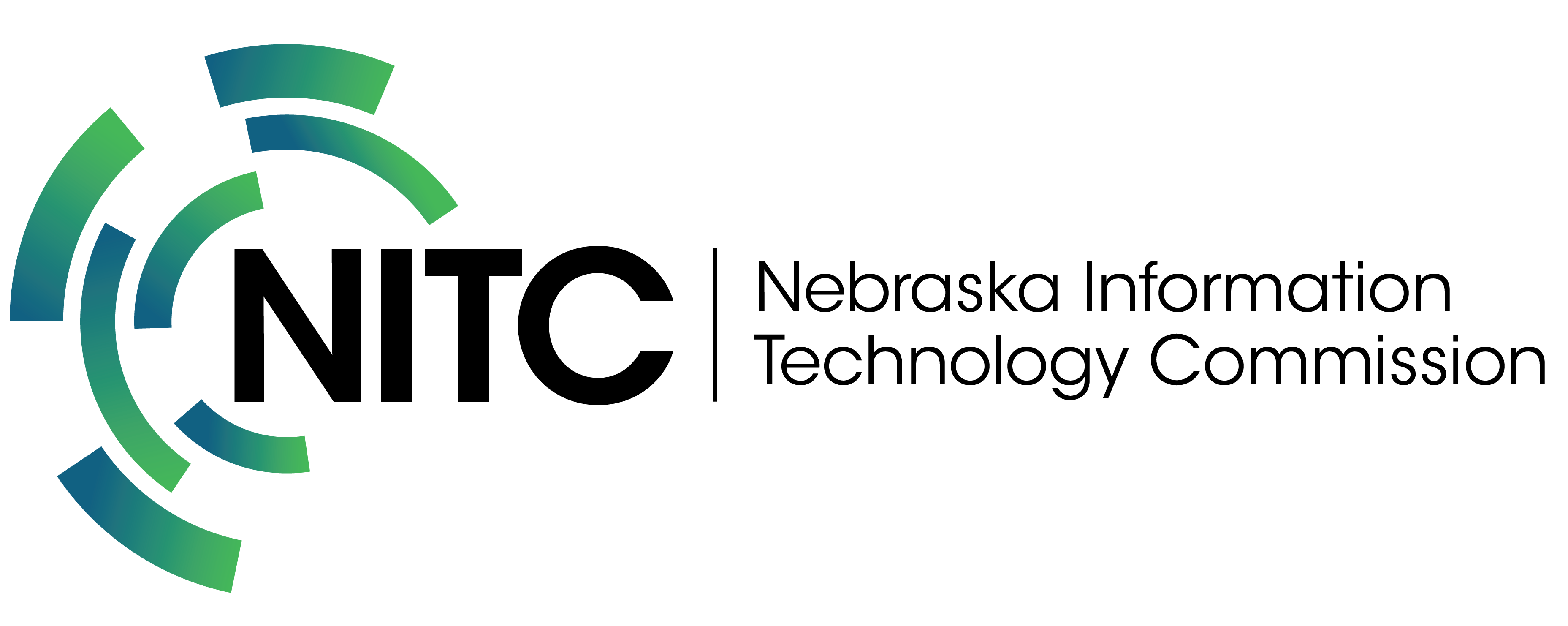TECHNICAL PANEL
Nebraska Information Technology Commission
Tuesday, May 9, 2000, 9:00 a.m.
Varner Hall - Board Room, 38th and Holdrege
Lincoln, Nebraska
MINUTES
MEMBERS PRESENT: Michael, Beach, Nebraska Educational Television; Brenda Decker, Department of Administrative Services; Steve Schafer, Chief Information Officer; Michael Winkle, Nebraska Information Technology Commission; and Walter Weir, University of Nebraska
OTHERS PRESENT: Rick Becker, Lori Lopez Urdiales and Tom Rolfes of the Office of the CIO/NITC; Dick Palazzolo, Public Service Commission
ROLL CALL AND MEETING NOTICE:
Mr. Weir, Chair, called the meeting to order at 9:05 a.m. Roll call was taken. A full quorum existed to conduct official business. Mr. Weir stated that the meeting notice and agenda was first posted to the NITC Web site and the Nebraska Public Meeting Calendar on May 5, 2000.
PUBLIC COMMENT: There was no public comment.
APPROVAL OF MINUTES:
A correction to the minutes was to change Mr. Decker to Ms. Decker on page two under Technical Reviews.
Mr. Schafer moved to approve the minutes as corrected. Ms. Decker seconded the motion. Motion was carried by voice vote.
INFORMATIONAL ITEMS:
Nebraska Higher Education Information Technology activities: Mr. Weir reported that the group met on Friday, May 5th. Dale Finkelson, currently chairs the group. The group has been working on a white paper to recommend a IP centric network. Mr. Weir attended the meeting and recommended to the group to brief the Education Council, the Technical Panel and possibly to the NITC. Mr. Rolfes reported that the group is on the Education Council, May 19th agenda. The Panel members asked if they could review the white paper prior to next month’s meeting. Mr. Weir agreed to get this to members via the Office of the CIO/NITC.
Technical Reviews
State Records Board grant applications. Four applications were reviewed by the panel.
1. Nebraska Arts Council
Project: E-granting for Nebraska Arts Council grants
- The project is technically feasible.
- The proposed technology is appropriate for the project.
- The project's technical elements can be accomplished within the proposed time frame and budget.
Reviewer Comments:
- Can be accomplished within the proposed time frame and budget if:
- Matching grants are secured;
- Commercial software applications (such as those cited) are appropriate; and
- Additional provisions for security and redundancy are included in the agency's on-going operations.
- This would be an excellent pilot project for an electronic grant process. It is recommended that the Nebraska Arts Council work with other agencies which administer grants to share information on this project.
2. Secretary of State
Project: Pilot Project with County Government to establish web sites.
- The project is technically feasible.
- The proposed technology is appropriate for the project.
- The project's technical elements can be accomplished within the proposed time frame and budget.
Reviewer Comments:
- Good aggregation idea.
- The proposal states that "and evaluation will be submitted to the State Records Board before the end of the year." Is this the fiscal year? Also, what will the evaluation for renewal of the project be based on?
- Expansion beyond pilot sites will involve several major issues:
- Ongoing funding to provide continued technical support and training for counties.
- Providing content that is more than static web pages. The proposal anticipates developing e-commerce applications for counties. Many counties now have computer applications supporting the following functions: Drivers license, boat registration, voter registration, retirement, budget, accounts payable, payroll, personal property billing, personal property records, real estate billing, real estate records, and several others. There are also many interactions between state and county governments, as well as opportunities to access state data or systems such as on-line purchasing. Not all of these systems lend themselves to Internet applications. For those that do, there are two issues. First, who will write the interactive programs? Second, what infrastructure must be in place to support the applications?
- The technical infrastructure in most counties is not adequate to support Internet applications. The UCC PCs are an option, but they are limited in number and to dial-up access to an ISP. By themselves, the UCC PCs will not be enough, and there are technical issues beyond the PCs and Internet access. Infrastructure issues include technical standards, authentication (including digital certificates), cabling, LAN support, redesigning business processes, training, and migrating the state's network to frame relay.
- Many of these technical issues also have some policy aspects that need to be addressed. Clarification of responsibilities and allocation of costs are the biggest. For example, the state will never be able to afford everything under #3, above. Some of these costs and responsibilities must be shared with counties.
3. Foster Care Review Board
Project: Enhancing interoffice and interagency communication through the implementation of email system…
- Not enough information to determine if the project is technically feasible.
- Not enough information to determine if the proposed technology is appropriate for the project.
- Not enough information to determine if the project's technical elements can be accomplished within the proposed time frame and budget.
Reviewer Comments:
- What computers are they installing the PGP software on? Are these 33/34 computers in place right now? Do these computers belong to the State? If the 33/34 computers are state property, will they require their Board members (350) to purchase this software also so that they can pass these confidential files back and forth?
- What is the timeline for replacing the rest of the 14 Macs? Does it make sense to invest in software for machines that may be replaced in 12 months or less - obviously depending on the timeline?
- I don't see a clear indication for how they are going to sustain the Internet access fees once the grant monies run out. Better utilization of staff time will not show a monetary increase in their budget unless they anticipate being able to reduce staff.
- The proposed project is not necessary for the goal of improving public access to information.
- Encryption technology is essential to insure private communications, but the project will not achieve this in most cases. Board members without encryption software would not be able to exchange secure e-mail with staff. Also, exchanging encrypted e-mail with HHS staff would require additional steps that are not reflected in the grant application.
4. Office of the Attorney General
Project: Placing Attorney General Opinions on the internet.
- The project is technically feasible.
- Not enough information to determine if the proposed technology is appropriate for the project.
- Not enough information to determine if the project's technical elements can be accomplished within the proposed time frame and budget.
Reviewer Comments:
- Request is for hardware and temporary assistance to add documents to the existing Web site. No information is provided regarding specific equipment requested or application/management process involved. Therefore, judging appropriateness is beyond ability of this review.
- How many opinions will be reformatted and prepared for placement on-line? This will make a difference as to whether this can be accomplished within the proposed time frame and budget.
Mr. Winkle moved to forward the Technical Panel reviews and comments to the State Records Board as stated. Mr. Weir seconded the motion. Roll call vote: Winkle-Yes, Weir-Yes, Schafer-Yes, Decker-Yes, and Beach-Yes. Motion was carried.
Collaboration Fund Review Process:
Mr. Becker reported that fourteen (14) project applications were received from thirteen (13) different agencies. Project requests totaled approximately $814,000. There is $500,000 available for funding awards. A detailed project summary will be sent to the Panel members. Mr. Becker will distribute the reviewers list to Panel members for their approval within the next week. The Government Technology Collaboration grants will be an agenda item for the June Technical Panel meeting. The NITC will take action on the Government Technology Collaboration Fund grant recommendations at the June 22nd meeting.
Updates and Work Groups
TINA Project, Brenda Decker
The updated needs assessment has been posted on the website. One-third of state’s inventory has also been posted. Providers have been in contact with the Division about the project. The consultant, Federal Engineering, is currently developing cost figures. Ms. Decker is in the process of forming the Network Architecture Work Group and would like to get the councils' representatives during their May meetings. It is projected that the work group will have their first meeting in June.
Wireless Project - Brenda Decker
The first draft of the report is posted on the web site. Data collection is completed but the project will continue to take information until the end of the report. Final report is due at end of July.
Security Architecture Work Group, Steve Schafer:
The first meet was held on May 5th. The next meeting will be one-day workshop held with IBM on one of the following dates: May 31st, June 1st or June 2nd. The outcome of the meeting will be to develop the categories for policy development, classification systems.
Assistive Technology Work Group - Steve Schafer:
(Beyond 2000 Conference: www.nde.state.ne.us/ATP/odyssey.htm)
The NITC approved expansions of the Technical Panel membership to include an additional member with assistive technology expertise. It was suggested that this member could take the lead on the Assistive Technology work group.
Demonstration of Skills Inventory, Walter Weir:
A computer demonstration was given on the Skills Inventory Database developed by the University. Categories of skills, levels of expertise, and sample of queries were give. This could be used to develop a database for technical reviewers and inventory of I.T. professionals for information sharing. It would support the clearinghouse model. The University would be willing to provide the database shell for the state to utilize. The database can be Web enabled.
Mr. Weir welcomed Dave Wagaman to the meeting.
Pending Work Groups -- State Enterprise Architecture Framework
Mr. Schafer provide the following list of possible categories: Application Architecture; Collaboration and Workflow Architecture (e-mail, imaging, workflow); Data and Information Architecture; Electronic Commerce Architecture; Hardware Platform Architecture; and Systems Management Architecture. He also provided a brief update on the following categories.
Collaboration and Workflow Architecture (e-mail, imaging, workflow): The State Government Council has a work group looking at these issues within state government.
Data and Information Architecture: Jon Ogden, Department of Roads, is very interested in this area and is willing to take the lead role.
Electronic Commerce Architecture: Panel member were is agreement that this work group should be established immediately. After discussion, it was agreed that Mr. Schafer will organized a small group to meet informally. The group should involve the University, Nebraska Online, the Division of Communication, and entities in the private sector who are doing e-commerce.
Hardware Platform Architecture: The Technical Panel's Security Work Group is currently dealing with this issue.
Next Meeting Date
The next meeting of the Technical Panel will be Tuesday, June 13, 2000, at Varner Hall-Regents Board Room.
ADJOURNMENT:
Mr. Schafer moved that the meeting be adjourned. Mr. Beach seconded the motion. All were in favor. Motion was carried. The meeting was adjourned at 11:45 a.m.
Minutes were taken by Lori Lopez Urdiales and reviewed by Rick Becker, Office of the CIO/NITC.
Meeting Minutes
